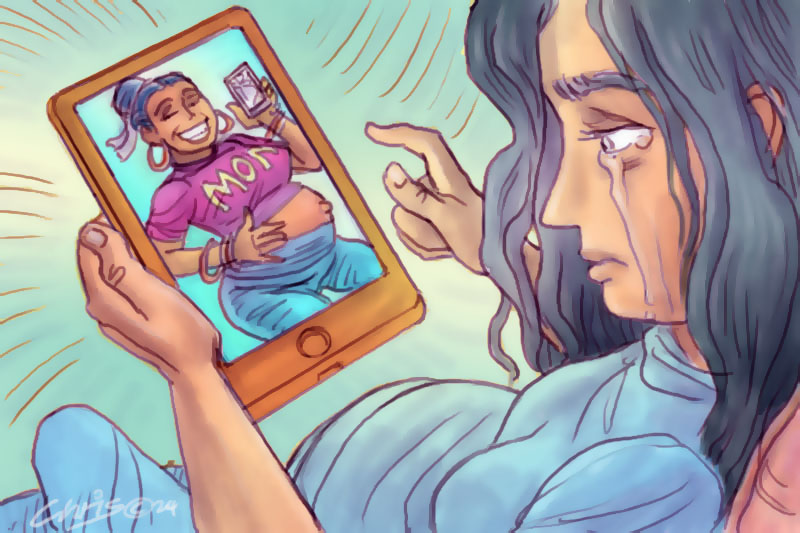The idea that pregnancy can safeguard against mental illness is no longer considered true. Pregnancy is a life-changing event with rapid physical, emotional and psychological changes that can affect how women view themselves, their relationships, and their roles in society. Navigating through these changes and adjustments can make women vulnerable to psychological distress, such as anxiety and depression. Among pregnant women, up to 20 per cent experience depression, and up to 35 per cent experience anxiety symptoms, with 15 per cent diagnosed with anxiety disorders.

One of the key goals of clinical researchers is to identify factors that increase the risk for psychological distress during pregnancy so that strategies for mitigating against these risks can be developed and implemented. While social media is commonly used by women (pregnant and otherwise) to connect with others and to stay informed, social media use has been linked to feelings of sadness and depression in the general population. Moreover, concerns have been voiced regarding how the sophisticated social media algorithms and features (designed intentionally to increase audience and viewer engagement) may lead to problematic media use and negative impacts on wellbeing. While there is evidence to indicate that heavy social media use is associated with psychological distress in teenagers, this issue has not been examined widely in pregnancy.
In recently published research, Adele Samra and I examined whether social media use was associated with psychological distress during pregnancy. We examined pregnancy-related anxiety — a distinct type of anxiety experienced during pregnancy in which women have specific fears and worries about childbirth, baby health, their own wellbeing, body image, and interactions with medical staff. We also examined symptoms of depression and problematic eating attitudes and behaviours (e.g. avoiding eating when hungry to reduce weight gain).
We recruited 225 pregnant Australian women and got them to complete questionnaires about their social media use, whether they negatively compared themselves to others on social media, their eating attitudes and behaviours, and their experiences of symptoms of depression and pregnancy-related anxiety. The results show that pregnant women who were heavy social media users had higher levels of depression, pregnancy-related anxiety, and problematic eating attitudes and behaviours. The link between heavy social media use and psychological distress was dependent on whether these pregnant women negatively compared themselves to others on social media and whether they were dissatisfied with their body shape and size. In other words, pregnant women who heavily use social media and who frequently compare themselves to others on social media are more likely to experience greater feelings of inadequacy and dissatisfaction with their bodies. This in turn intensifies their depression, pregnancy anxiety and unhealthy eating patterns.
This research highlights the potential negative impacts of social media on the wellbeing of pregnant women, particularly for those who may already be struggling with intense dissatisfaction with their appearance and body. Social media often showcases idealised versions of life and unattainable body standards. For pregnant women, the idealised body standard is the ‘perfect pregnancy bump’ where the weight gain associated with pregnancy is restricted to the stomach area while maintaining slender arms and legs. Often, media portrayals of pregnancy also promote rapid weight loss such that women are expected to return to their pre-pregnancy body shape and size soon after childbirth. For pregnant women who may already be struggling with the significant physical and emotional changes associated with pregnancy, they may increasingly turn to social media as a coping mechanism.
However, portrayals of unrealistic body standards and perceived pressure to conform to these standards can exacerbate feelings of inadequacy and negative emotions. This potentially can create a vicious cycle of poor physical and mental wellbeing for mothers, which in turn can have adverse consequences on the baby. The risks for premature birth and low birth weight are much higher for women who are depressed and/or anxious during their pregnancy.
There needs to be greater awareness in the general community of the potential negative consequences of heavy social media use on one’s wellbeing, as well as the unrealistic appearance-related expectations on pregnant women and new mothers. While these expectations are commonly promoted in mainstream and social media, they can sometimes be voiced by the woman’s family, friends and colleagues. These expectations can make it difficult for pregnant women and new mothers to get used to having a baby, settle into their role as mothers, and feel adequate in themselves. Health professionals and primary care services need to remain vigilant to the higher risk of mental health issues among pregnant women and new mothers. While most antenatal care providers in Australia screen for psychosocial risk factors and depression, screening for pregnancy-related anxiety is not routinely conducted. Therefore, there is a risk for women with pregnancy-related anxiety to not receive the support and services they need.
We need to be attentive and mindful that depression and anxiety may occur in pregnant women for many reasons. The findings of this research suggest that those reasons can include heavy social media use and dissatisfaction with their appearance and their bodies. Health professionals need to be cognizant to screen for these issues in order to provide appropriate support and services. Adapting support to meet the specific needs of pregnant women is essential for enhancing long-term outcomes for both the mother and child, otherwise we risk failing both mothers and their children.
Rachel Dryer is Associate Professor of Psychology, Australian Catholic University, Strathfield, NSW.
Main image: Chis Johnston illustration.